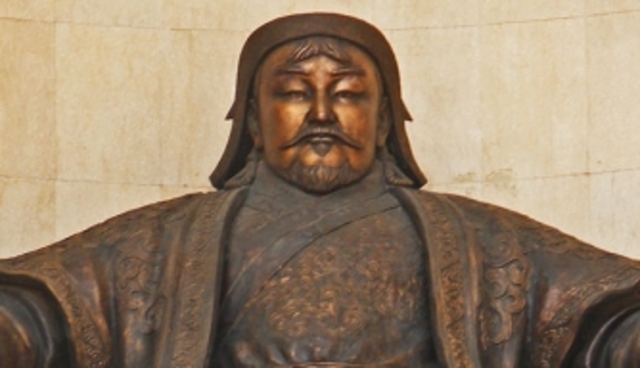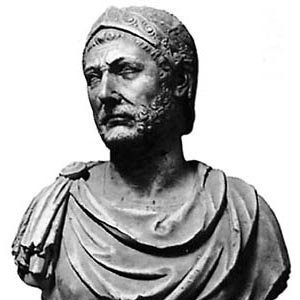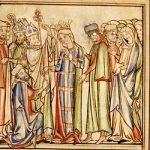History, Holidays & Observances on December 18
Today: Hannibal at the Battle of Trebia; Cromwell and the Jews; Lincoln & the 13th Am., Verdun, Charles Wesley, Stalin, The Nutcracker Ballet
And More . . .
 Holidays and Observances on Dec. 18
Holidays and Observances on Dec. 18
The Great O’s – The 2nd of the “Great O’s” of the Advent (see explanation on Dec. 17) celebrated today is “O Adonai” (O Lord)
Latin:
O Adonai, et Dux domus Israel,
qui Moysi in igne flammae rubi apparuisti,
et ei in Sina legem dedisti:
veni ad redimendum nos in brachio extento.
English:
O Adonai, and leader of the House of Israel,
who appeared to Moses in the fire of the burning bush
and gave him the law on Sinai:
Come and redeem us with an outstretched arm.
Isaiah had prophesied:
- “[…] but with righteousness he shall judge the poor, and decide with equity for the meek of the earth; he shall strike the earth with the rod of his mouth, and with the breath of his lips he shall kill the wicked. Righteousness shall be the belt around his waist, and faithfulness the belt around his loins.” Isaiah 11:4-5
- “For the Lord is our judge, the Lord is our ruler, the Lord is our king; he will save us.” Isaiah 33:22
218 BC – Hannibal mauls a Roman Army at the Battle of the Trebia
Military history 101 starts with the 2nd Punic War (218-01 B.C.), fought between the two great powers of the time, Carthage and Rome. It pitted the ancient world’s finest tactical commander, Hannibal of Carthage, against the superior strategists of the Roman Republic. In the end, Rome won the war and gained dominance in the Mediterranean World for the next 600 years.
That said, each and every battle that Hannibal fought, even his final defeat, was a tactical work of art. As was the Battle of Trebia, one of the first battles fought in Italy after Hannibal had crossed the Alps, Hannibal’s Army met the Romans on largely flat terrain near the Trebia River. The two sides were about equal in numbers, roughly 40,000 men, though Hannibal had significantly more cavalry.
On the night of the 17th, Hannibal hid a thousand soldiers in a ravine near the Roman camp. Early in the morning of 18 Dec., he sent out his cavalry to attack the Roman camp, with orders to retreat when they came out to do battle. It had its desired effect. The Roman Army poured out of camp, formed for battle, then followed the cavalry, fording the bitter cold River to engage the Carthaginian Army in battle formation across the river.
The Roman Army attacked the Carthaginian center. Hannibal sent his cavalry to attack the Romans on either flank, and at the same time, the force that had lain in wait now emerged and attacked the Roman Army from their rear. The Roman Army broke. The most experienced of the Roman legions, about 10,000 men, quickly formed a square and were able to fight their way off the battlefield. The Carthaginians slaughtered the remainder of the Roman Army, about 30,000 men.
1655 – The Whitehall Conference; Jews return to England
Jews had first come into medieval England on the heels of William the Conqueror in 1070. But they were not well received.
The reputation of Jews as extortionate money-lenders arose, which made them extremely unpopular with both the Church and the general public. While an anti-Jewish attitude was widespread in Europe, medieval England was particularly anti-Jewish. An image of the Jew as a diabolical figure who hated Christ started to become widespread, and myths such as the tale of the Wandering Jew and allegations of ritual murders originated and spread throughout England as well as in Scotland and Wales.
Persecution of Jews became increasingly common in medieval England, despite the efforts of the papacy, such as Pope Callixtus II, who in 1120 issued the papal bull Sicut Judaeis, expressly forbidding Christians from such persecution of the Jews. In 1290, King Edward I had issued an Edict of Expulsion, expelling all Jews from the country. The edict remained in force throughout the Middle Ages, until the matter was taken up by Oliver Cromwell, then the Lord Protector of England following the English Civil War (1642-51).
Cromwell, whatever his many faults, was a friend to the Jews. When Menasseh Ben Israel, a rabbi and leader of the Dutch Jewish community, approached Cromwell with the proposition that Jews should at long-last be readmitted to England, Cromwell agreed. Moreover, he wanted Jewish help to rebuild England after the destruction of the English Civil War. To that end, Cromwell convened the Whitehall Conference, hoping to gather support for his plans.
The Whitehall Conference, a convention of leaders from various constituencies in England, proved problematic. The merchants did not want competition from Jews. The religious leaders were concerned that Jews would try to convert Christians. The military leaders were willing to admit Jews on a probationary period, so long as they did not blaspheme Christ.
[Another] group consisted of the Millenarians and Sabbatarians, both of whom broke down into radical and more conservative wings. The conservative wing of this faction supported readmission with clauses built in that would make it possible for Jews to be thrown out if things did not go as planned. The radical wing argued that it was England’s divine duty to readmit Jews, or else face God’s wrath. Most members of this third faction hoped to convert Jews to Christianity upon their arrival in England, thereby hastening the second coming and the advent of the messianic age.
Cromwell could not get unanimity on a plan to readmit, but he ended up succeeding through the back door. The Conference determined that the Edict of Expulsion was a royal law, not one issued by Parliament. The conferees were the people who had just lopped off the head of a King and done away with the monarchy. Thus the conferees agreed that the Edict of Expulsion was no longer in force. Jews were free to immigrate to England.
1865 – The Thirteenth Amendment, prohibiting slavery, comes into effect
The 13th Amendment was pushed by President Abraham Lincoln because he was concerned that, after the Civil War, the Supreme Court might hold the Emancipation Proclamation invalid. The initial attempt to pass the Amendment out of Congress failed in the House in 1863. Lincoln made the passage of the Thirteenth Amendment his top legislative priority after his reelection in 1864, but it was by no means a sure thing.
Lincoln instructed Secretary of State William H. Seward, Representative John B. Alley and others to procure votes by any means necessary, and they promised government posts and campaign contributions to outgoing Democrats willing to switch sides. Seward had a large fund for direct bribes. Ashley, who reintroduced the measure into the House, also lobbied several Democrats to vote in favor of the measure. Representative Thaddeus Stevens later commented that “the greatest measure of the nineteenth century was passed by corruption aided and abetted by the purest man in America” . . .
Eggs, omelet, etc. . . .
On Jan. 31, 1865, having cleared the Senate, the proposed 13th Amendment narrowly cleared the House. Lincoln, though not required to do so, added his signature to the Amendment and it went to the states for ratification. Within three months, Lincoln was assassinated. The last state of the 3/4ths of states needed for ratification did so on Dec. 6, 1865, and the Secretary of State proclaimed the adoption of the Thirteenth Amendment on this date in 1865.
The Amendment is the only clause of the Constitution that reaches beyond the federal and state government to limit the conduct of private citizens, though it was suprisingly little used in the aftertermath of the Civil War and during Reconstruction. As historian Amy Dru Stanley summarizes, “beyond a handful of landmark rulings striking down debt peonage, flagrant involuntary servitude, and some instances of race-based violence and discrimination, the Thirteenth Amendment has never been a potent source of rights claims.” That said, in the modern era, the Thirteenth Amendment has been used to attack overt acts of racism that amount to imposing “badges and incidents of servitude” Furthermore, it has been used to justify legislation to protect migrant workers and to target sex trafficking.
1916 – WWI: The Major German offensive at Verdun ends.
The major German offensive of 1916, the Battle of Verdun, one of the longest and most costly in history, is finally is called to a halt by German commanders, having failed to achieve their objectives after ten months of fighting and over 700,000 casualties, including some 300,000 killed. By the battle’s conclusion, entire French villages had been wiped from the map; they were subsequently memorialized as having “died for France.” More than a century after the battle’s conclusion, over 10 million shells remained in the soil around Verdun, and bomb-clearing units continued to remove some 40 tons of unexploded munitions from the area annually.
1271 – Kublai Khan, the 5th “Great Khan” of the Mongol Empire, completes his conquest of most of China and Korea and, on this date, names his empire “Yuan” (元 yuán), officially marking the start of the Yuan dynasty. Mongol control of the Asian trade routes opened trade between Europe and China. The Italian merchant Marco Polo began his journey to China this year. The Yuan dynasty lasted a little more than a century before falling to the native Chinese Ming Dynasty.
1760 – In the wake of a major slave revolt in Jamaica, Tacky’s War, the Assembly of the British colony of Jamaica outlaws the African religious practice of obeah (akin to voodoo), with penalties ranging from banishment from the colony to execution. The legislation specifically bans use of contraband associated with obeah, including “animal blood, feathers, parrots’ beaks, dogs’ teeth, alligators’ teeth, broken bottles, grave dirt, rum, and eggshells.”
1892 – Premiere performance of The Nutcracker by Pyotr Ilyich Tchaikovsky in Saint Petersburg, Russia. It was not a great success at the time, but its popularity has grown over time, and performances of the Nutcracker at Christmas time now account for a substantial portion of the budgets of most ballet organization.
1898 – Gaston de Chasseloup-Laubat sets the first officially recognized land speed record of 39.245 mph (63.159 km/h) in a Jeantaud electric car.
1958 – DARPA, part of the U.S. Dept. of Def., launches Project SCORE, the first communications satellite. It both tested the payload capability of the Atlas rocked and showed the possibility of world-wide communications.
2018 – At 23:55 GMT, a meteor exploded over the Bering Sea with a force over 10 times greater than the atomic bomb that destroyed Hiroshima in 1945.
1707 – Charles Wesley, English missionary and abolitionist who was both a major figure in the First Great Awakening and the founder of the Methodist sect of Christianity.
1878 – Joseph Stalin, a paranoid psychopath, who, as 4th Premier of the Soviet Union, created a cult of Personality, oversaw the defense of Russia in WWII, and murdered tens of millions of his own people.
1075 – Edith of Wessex, a Queen of England who insured she would be treated well by history by commissioning the historians who would write her story.
1829 – Jean-Baptiste Lamarck, a Jesuit-trained biologist who laid the foundation for Darwin’s theory of evolution.
Christmas Ballet:
The Nutcracker suite tells the story of children who visit the Land of the Sweets, ruled by the Sugar Plum Fairy.





